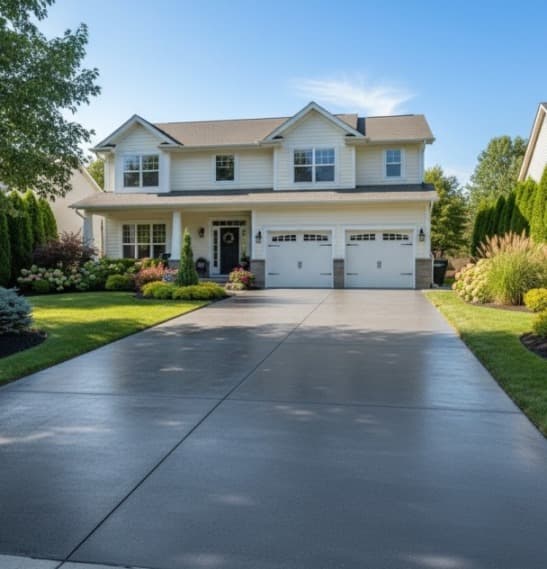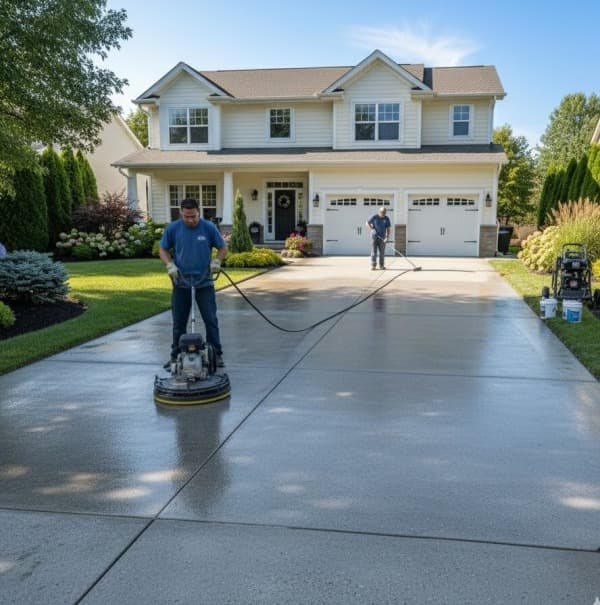So, you’re thinking about sealing your concrete driveway. Maybe you’ve noticed a few cracks, oil stains, or that dull, weathered look creeping in. The idea of sealing sounds promising; it’s often sold as the magic solution for longevity and curb appeal.
But is it really worth it? Well, like most things in home maintenance, the answer depends on your situation. Let’s walk through the pros and cons so you can make an informed choice.
What Is a Concrete Sealer?
A concrete sealer is basically a protective coating designed to shield your driveway from damage caused by water, chemicals, oil, UV rays, and daily wear. Think of it as concrete sunscreen; it keeps your concrete strong and attractive for longer without altering the substance underlying.
There are different types of sealers, each with its own purpose. Penetrating sealers, for example, soak deep into the surface to create an invisible barrier against moisture and salts: perfect for driveways in cold or wet climates.
On the other hand, film-forming sealers (like acrylic or epoxy) sit on top of the surface and can add a glossy or matte finish, giving the driveway a more polished look.
The right sealer depends on your priorities. Want that “wet look” shine? Go for an acrylic or epoxy type. More concerned about durability and water protection? A penetrating sealer is your best friend.
Read Also: Advantages of Buying a House with a Shared Driveway
Benefits of Sealing a Concrete Driveway
Sealing a concrete driveway offers numerous advantages that help extend its lifespan, enhance its appearance, and protect your investment. Some of the main advantages are described in detail below:
Protection Against Moisture and Stains
Sealing concrete driveways helps to create a barrier against water, oil, and other substances. This protection prevents stains from penetrating the surface, making it easier to clean.
Additionally, by repelling water, a sealer can reduce the risk of cracks caused by freeze-thaw cycles in colder climates.
Enhanced Durability
A properly sealed driveway can withstand wear and tear more effectively. The sealer adds a protective layer that helps prevent surface damage caused by heavy vehicles, foot traffic, and abrasive substances like de-icing salts. This increased durability can extend the lifespan of your driveway.
Easier Cleaning
Oil, grease, and tire marks are every driveway’s enemies. A sealed surface makes cleaning them up much easier. Instead of soaking into the concrete, spills sit on top: so a quick rinse or gentle scrub usually does the trick.
Improved Appearance
Sealers come in various finishes, such as matte, satin, or glossy, allowing you to customize the look of your driveway. A sealer can bring out the color of decorative concrete, making stamped or stained designs more vibrant and aesthetically pleasing.
Resistance to UV Damage
Over time, exposure to sunlight can cause concrete to fade or discolor. UV-resistant sealers protect the driveway from harmful ultraviolet rays, preserving its original appearance for longer periods.
Prevention of Weed Growth
Unsealed concrete may develop small cracks over time, which can become breeding grounds for weeds. By sealing your driveway, you create a surface that resists crack formation and minimizes the opportunity for weeds to take root.
Increased Property Value
A well-maintained driveway contributes to the overall curb appeal of your property. Sealing ensures that the driveway looks polished and clean, potentially increasing the resale value of your home.
Drawbacks of Sealing a Concrete Driveway
Sealing a concrete driveway offers many benefits, but there are drawbacks as well. Knowing the possible disadvantages will help you decide if sealing is the best option for your house.
Cost of Application
One of the primary disadvantages of sealing a concrete driveway is the expense. The cost of professional sealing services or purchasing high-quality sealers can add up, especially for large driveways.
Additionally, periodic reapplication is necessary to maintain effectiveness, further increasing long-term costs.
Time and Effort Required
Applying a sealer is a time-intensive process that requires proper surface preparation, application, and drying time.
For DIY enthusiasts, this can involve significant effort. If you hire professionals, you may also need to coordinate schedules and temporarily restrict driveway access.
Potential Slipperiness
Some sealers, particularly those with glossy finishes, can make the surface slippery when wet. This poses a safety concern, especially in areas prone to rainfall or for driveways with steep inclines.
Anti-slip additives can mitigate this issue, but they often come at an additional cost.
Limited Lifespan
Even the best sealers wear down over time and require reapplication every few years. Factors such as climate, traffic, and the type of sealer used affect how long the protection lasts. This ongoing maintenance can be a hassle for homeowners.
Risk of Improper Application
Achieving optimal results depends on proper application. If the surface isn’t adequately cleaned or if the sealer is applied unevenly, it may lead to blotchy finishes, reduced effectiveness, or premature wear. Hiring professionals reduces this risk but increases the cost.
Environmental Concerns
Some sealers, particularly solvent-based options, emit volatile organic compounds (VOCs) that can harm the environment and pose health risks during application. Although water-based sealers are more eco-friendly, they may not provide the same level of durability.
So, Should You Seal Your Driveway?
If your driveway faces harsh winters, heavy rain, or constant vehicle traffic, sealing is usually a smart move. It acts as insurance for your concrete, shielding it from harm before it occurs.
But if you live in a mild climate and your driveway already looks good, you might get by with simple cleaning and spot repairs instead.
Actually, here’s a good rule of thumb: if you notice water soaking into the concrete instead of beading up on the surface, it’s probably time to seal.
See More: How Close to My Property Line Can I Pour Concrete?
Tips for Choosing the Right Sealer
Selecting the right concrete sealer is just as important as the sealing process itself. The right product can make a big difference in how well your driveway is protected and how it looks over time. Here are some practical tips to help you choose the best sealer for your needs:
Consider Your Climate
Weather plays a key role in determining which sealer works best.
- For cold or freeze-thaw climates, choose a penetrating sealer that protects against moisture absorption and cracking.
- In hot, sunny regions, a UV-resistant acrylic sealer helps prevent fading and discoloration.
- Choose a breathable sealer for humid or wet areas to minimize the chance of peeling and trapped water by allowing moisture vapor to escape.
Decide on the Desired Finish
Think about the appearance you want for your driveway:
- If you prefer a natural, matte look, go for a penetrating sealer.
- If you want your driveway to have a wet look or glossy sheen, an acrylic or polyurethane sealer is a better choice.
Check for Slip Resistance
If your driveway is sloped or gets wet often, safety matters. Choose a sealer that includes slip resistance. You can also mix in a non-slip additive for extra grip.
Look for Eco-Friendly Options
Water-based sealers are a better choice for environmentally conscious homeowners. They emit fewer VOCs and are easier to clean up after application.
Evaluate Longevity and Maintenance Needs
Not all sealers last the same amount of time.
- Acrylic sealers usually last 2–3 years.
- Penetrating sealers can last up to 10 years.
- Epoxy and polyurethane options are extremely durable but harder to reapply.
Choose a sealer that balances durability with ease of maintenance based on how often you’re willing to reseal your driveway.
Read Reviews and Manufacturer Instructions
Before buying, check user reviews and always follow the manufacturer’s application guidelines. Some sealers perform better on specific types of concrete or require particular surface conditions for best results.
Consult a Professional
If you’re unsure about the type of sealer to use or how to apply it, consult with a professional. They can provide recommendations tailored to your specific driveway and ensure a smooth application process.
Final Thoughts
Sealing a concrete driveway isn’t mandatory but it’s definitely beneficial for most homeowners. It keeps your driveway looking newer, helps prevent cracks and stains, and can extend its lifespan considerably. Just make sure you do it right (or hire someone who will).
At the end of the day, it’s a small effort for a big payoff—cleaner, stronger, and better-looking concrete that stands the test of time.

